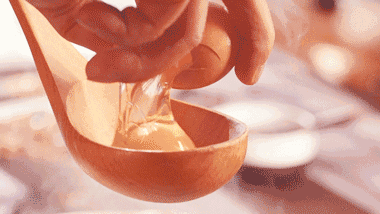
As a must-have ingredient for every household, many people think that “eggs” are easy to preserve. Just open and close the refrigerator door or store at room temperature, it will be no problem for more than half a month.
Under different temperature environments, how fast are eggs “deteriorating”? How to judge the freshness of an egg?

How does a good egg go bad?
From the outside to the inside, the egg is composed of seven parts: eggshell, air cell, shell membrane, egg white, chalaza, egg yolk and embryo.
There are many small holes on the surface of eggshells similar to the sweat pores of our skin. The water in the egg will evaporate through the small holes, and microorganisms such as external bacteria and mold can also enter the egg through the small holes.

The whole process of egg spoilage
Under the action of microorganisms and related enzymes, proteins are broken down.
“Paste-shelled eggs”: the decomposition of protein bands causes egg yolk displacement;
“Egg with loose yolk”: the yolk membrane is decomposed and the yolk is scattered;
“Turbid-liquid egg”: Microbes continue to multiply, egg yolk and white are mixed together;
“Rotten egg”: The decomposition of protein forms hydrogen sulfide, amines, skatole, indole and other putrefactive substances, which emit foul smell.
Deteriorating speed: one week of refrigeration is equivalent to one day at room temperature
The rate of deterioration of eggs has a lot to do with temperature. Eggs like a low temperature environment and deteriorate faster at room temperature.
Low temperature can help inhibit microbial activity, reduce water evaporation in eggs, and extend shelf life.
Eggs are left at room temperature for one day, the degree of deterioration is equivalent to a week in a refrigerated environment, so fresh eggs should be kept refrigerated.
Egg refrigeration can prevent Salmonella infection, and refrigeration can also hinder the aging process of egg ingredients.
Storage period under different temperature conditions:
Keep refrigerated at 2℃~5℃, best to eat within 40 days
Store at room temperature in winter and try to eat within 15 days
Store at room temperature in summer, try to finish eating within 10 days
One way to judge the freshness of eggs
The air cell is a space where the eggs store gas (oxygen) for the breathing of unhatched chicks.
As the storage time is prolonged, the moisture and carbon dioxide in the egg continuously penetrate through the holes in the eggshell, and the air cell will continue to increase.

Observing the size of the air cell is a simple and effective way to check the freshness of eggs. It can be said that every egg is born with an air cell. The fresher the air cell, the less obvious and the higher the nutritional value.
When purchasing, you can pick up the eggs and look through the light. The smaller the air cell, the fresher the eggs.
At the same time, it is also recommended that you give priority to the boxed brand eggs placed in the refrigerator, and try to pick those produced within a week. The newer the date, the better.
If you want to buy eggs in bulk, the first choice is a large supermarket, a large farmer’s market and other places with fast transactions, and you can buy them in small quantities multiple times.
Special storage note list for eggs
When storing eggs, pay attention to the following points.
Do not clean before storing
There is a protective coating on the outside surface of egg, called the “cuticle”, which can prevent bacteria from entering the egg and keep the egg fresh .
After washing the eggs with water, the “cuticle ” will fall off, causing bacteria to invade, water evaporation, and accelerated egg deterioration. Before cooking, you can rinse it before putting it in the pot.
To wipe off the chicken manure from the eggs
Many people believe that eggs with “chicken droppings” on their surfaces are more natural and fresh. However, a large number of bacteria are often attached to the egg surface, and lots of poultry feces, mucus, blood stains and other dirt on it.
During the storage process, some pathogenic microorganisms may enter the inside of the egg through the stomata on the eggshell and cause deterioration, so the shelf life is often shorter.
After you buy it home, first use a clean cloth to gently wipe off the droppings and other dirt on the surface, then put it in a separate box in the refrigerator to avoid cross-infection.
store with large side up
With the extension of storage time and the change of external temperature, the mucin in the protein will be dehydrated and thinned under the action of protease, and lose the role of fixing the yolk. Put the large end of the egg upright. The gas in the air cell will prevent the yolk from getting close to the shell.
Take the eggs in the refrigerator when you use them
The low-temperature egg will “sweat” at room temperature after being taken out, and the microorganisms in the small water droplets are more likely to penetrate the eggshell and penetrate into the inner layer of the egg liquid to infect the egg.
Eggs taken out of the refrigerator are not suitable for long-term storage, and it is not suitable to put it back again.
Comments